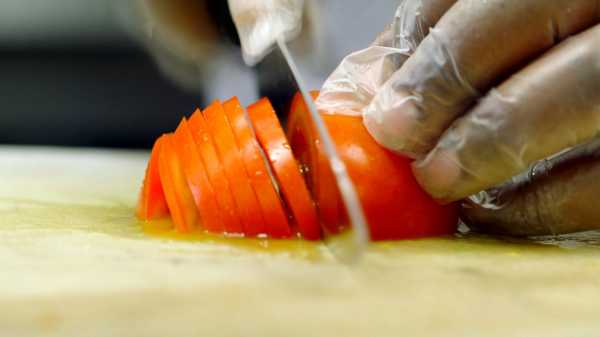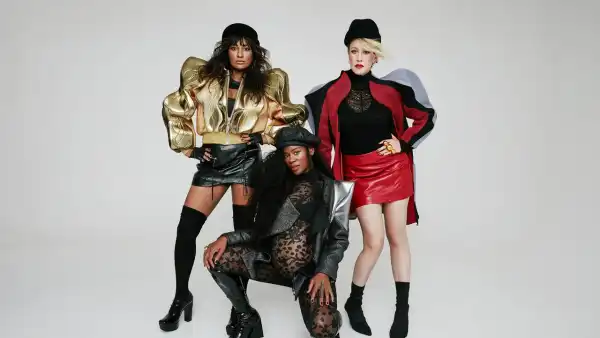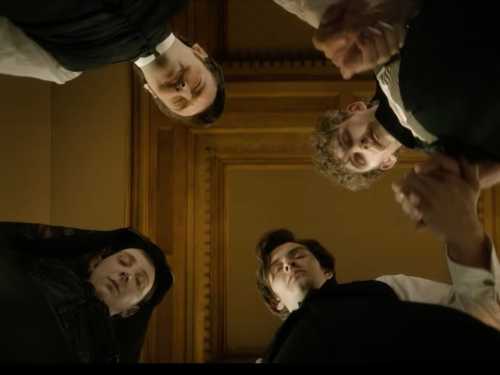
As Thomas Lennon’s forty-minute Oscar-nominated documentary short “Knife
Skills” begins, it’s opening night at
Edwins, a new French restaurant in
Cleveland. Just before showtime, a sharp-dressed proprietor in a pink
necktie talks to his staff in the dining room. “This is going to be the
most anticipated restaurant opening that Cleveland’s seen,” he tells
them. “And it happens today in about ten minutes.” He’s earnest, happy,
and intense, with a kind look in his eyes; they’re nervous but excited,
in chef’s whites and the vest-based formal wear of the dining room. The
cause for the anticipation is hinted at by two title cards: one that
tells us that Edwins aims to be the best classic French restaurant in
the United States, and another that tells us that Edwins is staffed by
people recently released from prison. In the kitchen that night, as
pressure builds, a French chef with a heavy accent yells, “I need zhose
rabbits, now!”
The film cuts to six weeks earlier, as Edwins, which is both a culinary
school and a restaurant, welcomes its first class. The proprietor
introduces himself as Brandon Chrostowski and says, “The short of it is,
a restaurant saved my life. And, because of that, I’m here today and
we’re doing what you see.” The camera shows a man in the group nodding
in understanding. We watch as the staffers learn the art of preparing
French food, intently studying the regions of France on a map, learning
the names and ingredients of artichauts à la barigoule, tarte de
lapin au Parmesan et jambon en croûte, pâtes ditalini au fromage de
Fontina. In one scene, a trainee watches with rapt focus the proper
julienne slicing of a zucchini. We see food—meat in a grinder,
vegetables in a bowl—and faces observing with attention and concern.
Lennon’s camera shows us the front of the house as patrons are greeted
cheerfully, and, over the shoulder of Chrostowski, we keep a wary eye on
a server who, Chrostowski worries aloud, may be an addict. We
immediately gravitate, as Lennon did when he was shooting the film, to a
few individual characters, and learn about their desire to get a second
chance and the challenges they face as they pursue it.
“Knife Skills” doesn’t provide a simple redemption story. It is a chance
to get to know a group of people in a specific time and place and to
feel the energy of a good idea in action; we, like the participants,
hope for its success and worry about potential defeat. Recidivism is
common among former inmates, drug relapses by former addicts are
pernicious, and the first year of reëntry is an especially perilous
time. The film portrays this sensitively and straightforwardly, and with
an effort to provide just enough context. Lennon doesn’t feature talking
heads, long explanations of social issues, or even a full description of
the restaurant’s mission and process. “Knife Skills” doesn’t tell you,
for example, that Edwins stands for “ed” plus “wins”—“education wins”—but,
if you freeze-frame a shot of an article about the restaurant, you can
read that for yourself. It doesn’t mention that Edwins is a nonprofit,
or that it has expanded to include housing and a campus and a thrift
store for residents, or that the restaurant continues to be successful
and
beloved.
I had to Google to discover an amazing postscript: last year,
Chrostowski took a leave from Edwins, to run for mayor of Cleveland.
“We live in an era of readily available information,” Lennon told me.
“I’m defining my job quite narrowly: Can I make you think about an issue
and care about an issue? Think about the people and care about those
people?” If he can do that, he said, we can easily learn more ourselves.
The film is informed by sympathy and curiosity, but Lennon didn’t come
to it by way of an intellectual grasp of criminal-justice reform or a
passion about the history of mass incarceration, he told me. “I now care
a lot about those issues, but that’s not what brought me to this story,”
he said. The story came to him.
Lennon met Chrostowski in 2013, at a dinner party at the house of mutual
friends, Karen and David
Waltuck, the
longtime owners of Chanterelle, in Manhattan, which closed in 2009 and
where Chrostowski had worked. “I couldn’t get a fix on him,” Lennon
said. “He was mumbling a lot, staring down at his meatloaf. He mumbled
something about how he was going to be opening the best French
restaurant in all of the United States, and that it was going to be in
Cleveland, and all the people in the restaurant were going to be fresh
out of prison. I knew immediately that there was a film there.” The
timing was fortuitous; Chrostowski hadn’t yet signed the lease. Two
weeks later, Lennon drove to Cleveland with a car full of film equipment
and lights and just “hung around,” trying to get a sense of Chrostowski
and his project. He came back a couple of weeks after that, when the
first potential trainees arrived, and then periodically for several
months. He shot a huge amount of footage, which resulted in many choices
to be made in the editing room (his editor and co-producer, Nick
August-Perna, was an invaluable part
of the process, Lennon said), and that bounty, combined with a lack of
money, made for a years-long completion process.
Lennon, who is in his sixties, is an independent filmmaker, but he
wasn’t always—he got his training through the TV networks, “back when
networks did some really good documentary work,” he said, and he worked
with great filmmakers like Alan and Susan
Raymond when he
was starting out. In his thirties, he made work for “The American
Experience” and “Frontline,” followed by historical series, including
“The Irish in America: Long Journey Home,” with Disney and PBS, and
“Becoming American: The Chinese
Experience,” with Bill Moyers.
“Now I’m very much of an indie, raising my own money,” he said. “Knife
Skills” was completed in part with a grant from the Soros Foundation and
with support from his friend Joan Ganz Cooney, the legendary co-creator
of “Sesame Street” and co-founder of Children’s Television Workshop.
When the 2018 Oscar nominations were announced, two weeks ago, Lennon
was too nervous to listen to the broadcast. “The night before, I was
just a mess,” he said. “So I woke up early and I went to the gym, and
then I went to the supermarket and got my wife her milk and her coffee.
I looked down at my phone and it was eight thirty-five. And I said to
myself, ‘If nobody calls me in the next five minutes, my goose is
cooked.’ ” Then his phone rang. “Knife Skills” had been nominated for
Best Documentary (Short Subject). “What I felt was this enormous sense of
relief that after the long labor of this film, I no longer needed to
worry,” he said. “I knew that it would find its place and that people
would see it. The wind is in the sails; this film’s going to be O.K.”
Watching the film makes you feel like things are going to be O.K.,
too—not because of naïve idealism but because of its subjects’
dedication to ideals that are based in reality.
The film, toward the end, has an emotional graduation scene—hugs,
smiles, words of pride and mutual appreciation. The love in the room, in
that group of people who made it through the program, Lennon said, was
palpable, “crossing from founder and chef to trainees but also
horizontally among the trainees. The affection was extraordinary. It
wasn’t universal—there were conflicts. But I think that period of
reëntry into society after prison is intensely lonely.” Edwins provides
an alternative to that, and also a support system. “I had the feeling
that most everyone in the program, or at least the ones I talked to, had
this gnawing sense of a vulnerability that they wanted to fix, a fear
that they might blow this second chance,” Lennon said. “And the
connection that they had with each other, and to people who they
perceived as offering them a lifeline, was really intense.” In one
scene, Alan, a trainee who speaks fondly of his mother and her love for
cooking, goes to visit her and brings a picture of Gilbert, the French
chef and instructor, to show her. “This is my buddy, right here,” he
tells her.
Sourse: newyorker.com






